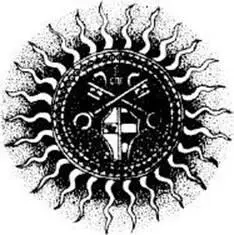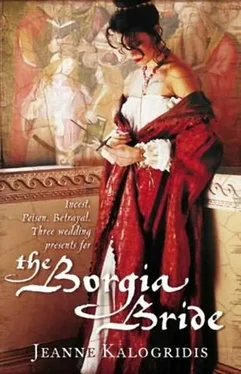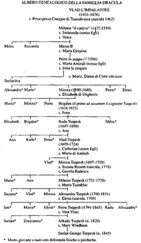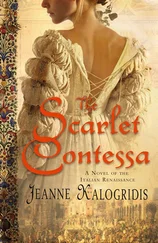Cesare went over to his sister, motioning for her to remain in the bed. ‘Rest, rest,’ he said. ‘You have earned it.’ They embraced, both smiling, then Cesare retreated from her a bit and, turned to me to kiss my hand.
The touch of his lips against my skin both thrilled me and made my skin crawl. He was to all appearances the affectionate brother: there was no trace of the monster who had leaned over the baby’s crib.
‘You have a beautiful son, Lucrezia,’ Cesare told her, which made her beam with pride. ‘I was just telling Sancha, it is like looking at you when you were a baby, not so many years ago.’
‘You were so protective of me, even then,’ Lucrezia said happily. ‘Tell me, will you be staying with us a while?’
‘Sadly, no,’ Cesare replied. ‘I had only time enough to conduct some vital business with Father. I have to return to the field at once. Pesaro waits.’
She coloured slightly at the mention of her former husband’s city, then said, ‘Oh, but you must stay! You must spend some time with the baby!’
Cesare sighed, an impressive show of reluctance. ‘It breaks my heart,’ he said. ‘But I have come to say both hello and farewell; I am on my way this instant back to my men. Of course,’ he added solicitously, ‘I could not leave without seeing you and little Rodrigo.’ He gave me a cursory glance and added, as an afterthought, ‘And Sancha, too.’
‘Very well,’ Lucrezia said sadly. ‘Then give me a kiss, and the baby one too, before you go.’ She paused. ‘I will pray for your safety and your success.’
‘I am glad for your prayers,’ Cesare said. ‘I will need them. God be with you, little sister.’ He embraced her again, and kissed her solemnly on each cheek; she did the same to him, and so they took their leave.
Cesare turned to me, uncertain; I held back my hand and instead gave him a nod. ‘I shall pray, too,’ I said, though I did not say precisely what those supplications would contain.
‘Thank you,’ Cesare said, and then he moved toward the cradle.
I rushed to arrive there first, and held little Rodrigo tightly in my arms as his uncle bent down and gave the infant a kiss.

In the end, my prayers, and not Lucrezia’s, were answered.
Cesare rode northward and returned safely to his camp; but before he could arrive at Pesaro’s city gates, his French army was called away by King Louis. Duke Ludovico had rallied enough forces to make a formidable attempt to retake Milan (a fact which no doubt must have given Cesare’s beautiful prisoner, Caterina Sforza, good cause for gloating).
Bereft of soldiers, silently cursing the French, Cesare was forced to abandon his efforts to take Pesaro.
At supper, His Holiness flushed red with rage as he recounted the tale, and railed about the fickleness of the French King.
It took all my self control to suppress a satisfied smile at the news.

***
Word came from the battlefield that Cesare had reluctantly negotiated a truce with Giovanni Sforza in Pesaro, and was returning home, escorted by the papal army and accompanied by his lovely prisoner, Caterina Sforza, who would be relegated to the strong stone walls of the Castel Sant’Angelo. I dreaded his arrival.
Donna Esmeralda constantly bore fresh, troubling gossip. Around Rome, a new phrase had become the fashion: ‘the Borgia terror’. This was used to describe the mental state of those unlucky enough to serve the Borgias and be privy to their secrets, for the price of such was becoming more and more obvious.
It was widely accepted as fact-though scrupulously ignored by the family-that Cesare had murdered his brother Juan out of an overwhelming desire to seize all of Italy for himself. It was fate, not coincidence, that he had been named for the imperial rulers of ancient Rome.
So it surprised no one when the Spanish Constable of the Guards-a man once trusted and honoured by Cesare, but who had lost his master’s favour-was found floating in the Tiber. His hands had been tightly bound behind his back, and his body shoved inside a burlap sack.
I never spoke of such things to Lucrezia or Jofre, nor did His Holiness mention them during his audience or at our now occasional suppers, even to denounce the heinous charges against his favourite son. It was as though the incident with the poor constable had never occurred, as though the man had never existed.
There were other deaths Esmeralda spoke of: two occurred under curious circumstances in Cesare’s camp.
The first was the mysterious passing of Bishop Ferdinando d’Almaida. D’Almaida, rumoured to be as wicked and ambitious as any Borgia, relentlessly shadowed Cesare from the instant he married Charlotte d’Albert all the way to the battlefield in Romagna. Many suspected him of being a spy for King Louis.
One day, Cesare declared to his men that d’Almaida had suffered a mortal blow ‘during the course of battle’-but no one was permitted to view the corpse, and a hasty burial followed. Servants who bathed the body reported that the bishop had never received a single wound; the cause of death, instead, was ‘Borgia fever’-a condition caused by a steel-blue powder.
Canterella: a second new term came into fashion, and was whispered throughout Rome.
Sometime after, another victim fell, Cardinal Giovanni Borgia, known as ‘the Lesser’. This cardinal was a young cousin of the Borgias, of a different branch of the family from Cardinal Giovanni Borgia of Monreale, ‘the Greater’, who had presided at my nuptials.
Whatever this unfortunate young Giovanni knew that endangered him, I cannot say. I do know this much: the man was greatly in debt, and close to his more powerful kin. He had set out from Rome to meet with Cesare privately in the Romagna-ostensibly to congratulate him on his recent conquests at Imola and Forli.
But before Giovanni could reach Cesare’s camp, he was consumed by a sudden ague-‘Borgia fever’, no doubt; the symptoms of the canterella were coming to be known as a high fever and a bloody flux. The cardinal died shortly thereafter.
His body was sent back to Rome, where it was swiftly interred at the cathedral at Santa Maria del Popolo. The grave was unmarked.
One night at supper, Jofre remarked that the cardinal’s passing had been a shame.
His Holiness slammed his fork down on the table with such force that we all started; I looked up from my meal to see him red-faced, scowling.
‘Do not mention that name to me ever again,’ Alexander scolded his son, with a ferocity that left us all silent for some time after.
‘Did I mention what Baby Rodrigo did today, at luncheon?’ Lucrezia asked gaily, breaking the awkward pall.
This soothed His Holiness; he turned towards his daughter and smiled expectantly.
‘He is so strong-always kicking his arms and legs-and I know he is far too young, but today, he pulled so hard upon my arm, I thought he would sit up on his own.’
Alexander’s mood immediately became indulgent. ‘You were a strong baby,’ he said, with paternal pride. ‘You and Cesare. Both of you sat up and started walking early; why, I had you upon a saddle with me by the time you were barely two years old.’
Lucrezia returned his smile, relieved that Alexander’s ill humour had passed.
At supper’s end, Lucrezia went over to her father and said softly, ‘You must forgive Jofre. I know he did not mean to trouble you with sad thoughts.’
Читать дальше
Конец ознакомительного отрывка
Купить книгу














